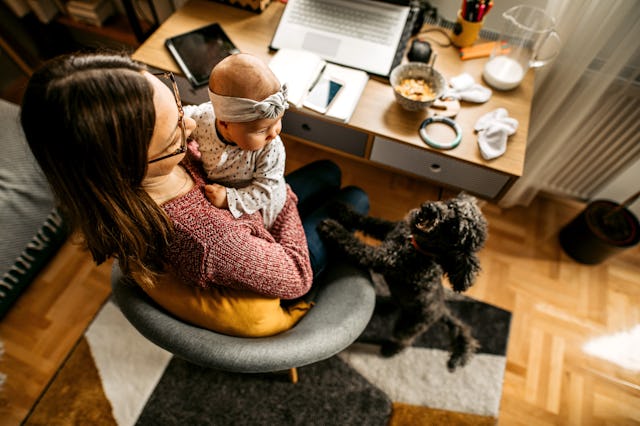Your Dog Is Jealous Of The Baby. You're All Touched Out. What Now?
It’s a lot to deal with, but experts have a few ideas to help.

You finally make it home from the hospital with your new baby, who has been hanging on you, breastfeeding, cuddling, and sleeping for multiple straight days on end — only to find your fur baby waiting for some attention themselves. In new baby days (and beyond), it can feel like your baby, dog, and other kids are all competing for a piece of mom, sometimes very literally. While one is nursing and you are reading to another, the dog comes to nudge the book for a pet. While you want to have enough love and energy to go around, sometimes it's impossible — and overwhelming — and you start to feel all touched out.
You might even feel additional pressure to ensure your dog "likes" your baby, or that they are getting appropriately acclimated to each other, for everyone's safety and happiness. "Dogs are smart, and dogs are observant. Once the dog makes a negative association with the baby, signs of 'jealousy' can manifest," says Seattle-based Rachel Salant, an animal behavior specialist with Veterinarians.org. "Our interpretation of what might be considered jealousy in a family dog can arise when a dog accustomed to a certain level of attention or lifestyle has their environment suddenly changed or altered without much preparation or time to adjust. A sudden change in the amount of attention the dog receives, a change in her feeding/walking schedule, a change in sleep schedule, [or] the addition of a screaming/crying baby with unpredictable movements can all affect a dog's behavior, especially if that dog has never been exposed to anything like that before. "
Try these pro tips to ensure your dog, your baby, and also quite importantly, you get enough attention and rest.
Acclimate the dog to new baby life before they are even born.
Just as you prepare the nursery, install the car seat, practice some nesting, and scramble towards maternity leave at work, you can prepare your dog for your new addition. "Start exposing your dog to the new sights, sounds, and smells of a baby before the baby arrives," Salant says. You can do this by having them smell baby lotions and creams, building the bassinet or gear that might hang out in spaces the dog is usually in, and generally getting set up ahead of time.
Take an empty stroller along for walks with your dog before there's a baby in it yet to acclimate the dog, according to Niki Dawson, Director of Emergency Response for Guardians of Rescue in New Jersey. The certified animal control officers also recommend teaching the dog the command "go away" during pregnancy (umm, can we teach our fussing toddlers this, too?!). Toss a treat and say the command, working up to no treat, so you have this tool in your toolbox during baby naps or nursing, she adds. You can also start to hand-feed your dog, gently pulling on the ears and tail while he's eating, to prepare him for "seeing hands and food together," she says. "When the baby becomes mobile, the dog won't see the baby as a threat."
Recognize signs that your dog is getting stressed.
Even if you have the seemingly most harmless bundle of fur ever, all three of our experts recommend never leaving the dog alone with the baby. "It's important to watch your dog's body language carefully, including ear and tail placement as well as the tension in their mouth/lips. Never leave a dog alone with a baby or small child," says Boulder, Colo. veterinarian Dr. Angie Krause. "Many people miss the early signs that their dog is stressed. If you are expecting to welcome a baby, spend some time learning canine body language. This includes ear and tail placement, mouth tension, and behaviors (like lip licking and yawning) that indicate your dog is stressed."
If you are seeing this, and even before, you can both enlist the help of a professional dog trainer, and also you can create positive associations between the dog and baby. Try creating routines and boundaries for your dog to reduce anxiety, avoid punishing or yelling at the dog, and give treats anytime the dog is around the baby so that the dog creates those positive associations.
Dawson says that lunges, aggression, or growling towards the baby should warrant an immediate consultation with a trainer or behaviorist, and your vet might also have a recommendation.
Don't go at it alone.
All of this can be totally overwhelming when you are just trying to survive and keep your new baby happy and fed. It's the perfect time to recruit the neighborhood's dog-walking teenager to help you maintain the dog's routine and get you some space. Ask friends and relatives to come play with the dog while you get a break or run an errand, or appoint another older child as the dog's new bestie to delegate some of the tasks. That simple dog walk or jog can gain you hours of peace — "A tired dog is usually a happy dog," Dawson says.
If you are alone most of the time with the baby and the dog, create a safe space for the dog to retreat where the baby can't go (put those baby gates to use!). "Designate safe zones for your dog with the use of baby gates and a crate. All dogs need downtime and should have a quiet space to retreat when necessary. When you've identified this space, throw a treat in the crate or on his bed and say, "Go to your spot,'" Dawson says. "Repeat this as often as necessary until this becomes one of his commands like 'sit' or 'off.'" If crating, make sure you give the dog a high-value treat such as a bully stick or favorite toy so crating is seen as a positive thing."